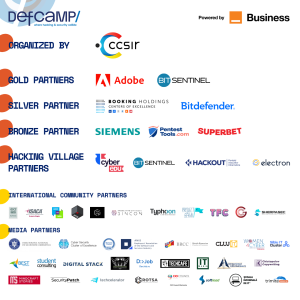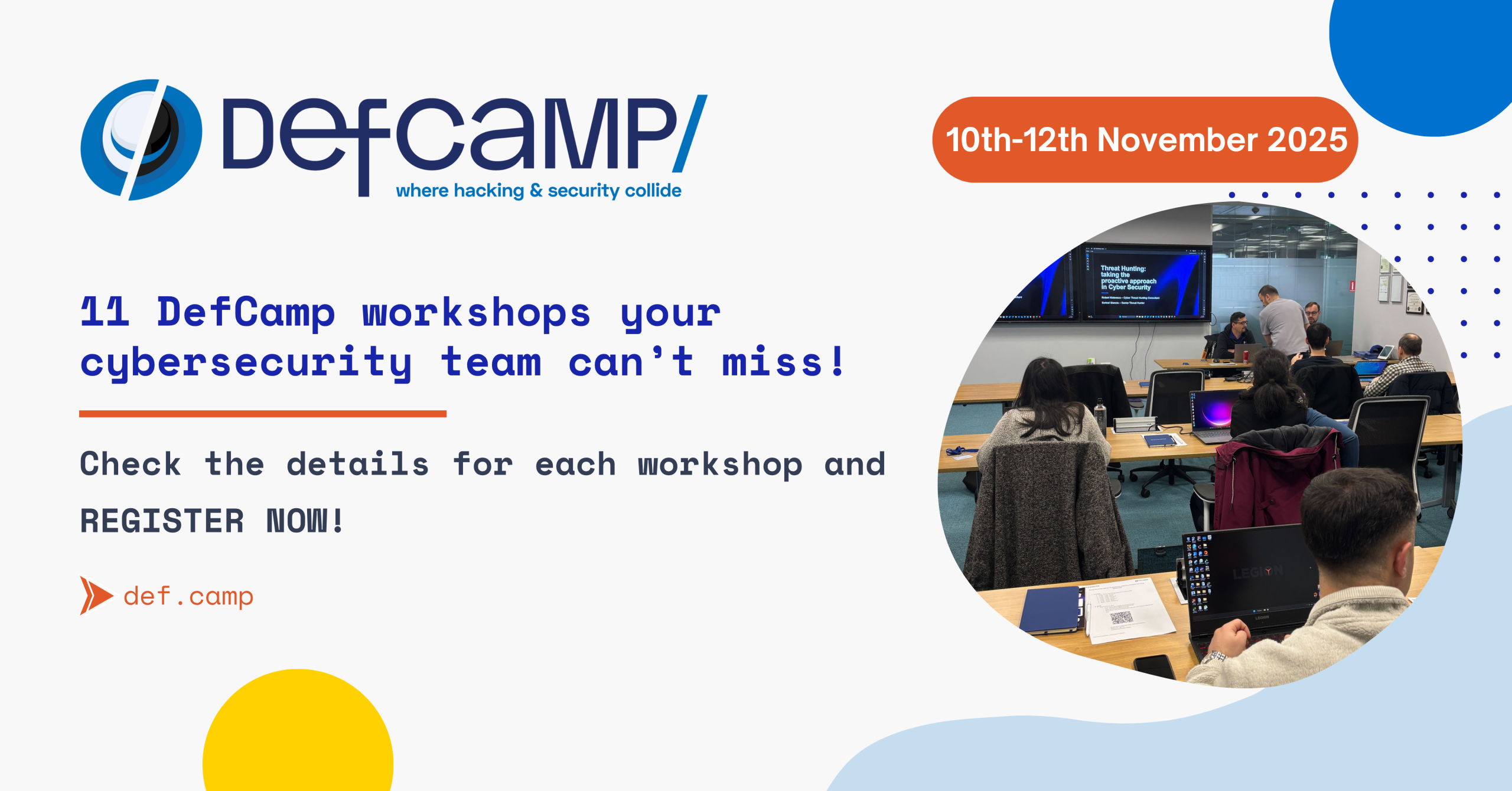In today’s fast-shifting cybersecurity landscape, tools and policies alone won’t keep you safe. What truly makes a difference is how skilled, adaptable, and well-coordinated your team is when things get tough.
For over a decade, DefCamp has been a hub for learning, experimentation, and pushing boundaries. Education is a core focus: we help security pros keep their skills razor-sharp and level up.
This November 10-12, dive into our hands-on workshops and watch your team go from good to unstoppable! Red team, blue team, SOC, DevSecOps, or embedded systems: no matter your flavor, we’ve got sessions that pushes boundaries and train you to think like a hacker when it matters most.
Discover why attending is a game-changer, how your team grows in capability and coordination, and, most importantly, what each of the 11 workshops brings to the table.
Why your team should join (together) the DefCamp Workshops
| BENEFIT | HOW IT TRANSLATES INTO PRACTICE |
| Shared vocabulary & mindset | All participants learn the same frameworks, tools, and mental models – reducing friction when collaborating later. |
| Hands-on, realistic training | Instead of passive lectures, your team works on realistic labs that mimic real attacker techniques. |
| Cross-role synergy | Developers, pentesters, analysts, and leadership gain mutual exposure to each other’s challenges and constraints. |
| Skill gap identification | You’ll see strengths (who thrives under pressure, who has deep technical insight) and gaps, which inform future training or team structure. |
| Faster ROI | A one-off intensive workshop often accelerates learning far beyond ad hoc self-study – meaning your security posture improves sooner. |
When you send a team, you also unlock softer but essential gains: morale, confidence, and trust. A team that trains together in adversity tends to perform better when real incidents hit.
How do the DefCamp Workshops sharpen cybersecurity skills?
🟠 Adversarial thinking: walk in an attacker’s shoes – understanding the attacker mindset helps your team anticipate rather than just react.
🟠 Tool fluency: many capabilities (debugging, exploit development, reverse engineering) are hard to internalize via reading – you pick them up faster with hands-on labs.
🟠 Pattern recognition: after certain classes of vulnerabilities or attacks, you begin to intuitively spot them – accelerating triage and defences.
🟠 Muscle memory under pressure: when under time constraints or ambiguity (as in labs), participants learn to stay composed and methodical.
🟠 Better feedback loops: instructors and peers provide immediate feedback, which accelerates correction of misconceptions or sloppy habits.
Given how fast threat tactics evolve, these intensives help your team stay ahead rather than fall behind.
Workshop at-a-glance: what each DefCamp Workshop delivers
Below is a summary of each workshop, highlighting its focus, format, and why your team might choose it.
1. HeapVault – Heap exploitation made simple
- DateFormat: 9-hour hands-on session
- What you’ll do: work through heap internals (malloc, free, chunks, hooks), fastbins, tcache, unsorted bins, FSOP, modern heap techniques.
- Who it’s for: participants with some prior stack/ROP knowledge who struggle with heap exploitation
- Why it matters: many real-world memory vulnerabilities are heap-based; understanding allocator internals is key to both exploiting and defending these attacks.
2. Cyber threat intelligence and investigations
- Format: ~7-hour workshop
- What you’ll do: learn the four types of threat intelligence (strategic, tactical, technical, operational), classify threat actors, use tools (VirusTotal, YARA, Snort), craft IoCs, integrate CTI into defenses.
- Who it’s for: analysts, SOC teams, incident responders, or security operations professionals wanting to build intelligence-driven defenses.
- Why it matters: defense is no longer about reaction – modern organizations need proactive intelligence to spot and prevent attacks before they succeed.
3. Human error: the hidden threat to physical security
- Format: ~half-day / interactive workshop
- What you’ll do: explore case studies of physical security failures (tailgating, device planting, procedural lapses), simulate attack vectors targeting human mistakes, devise mitigation strategies.
- Who it’s for: any team that handles security operations, facility access, compliance, or wants to integrate physical + digital security postures.
- Why it matters: when attackers can simply walk in or trick staff, all your digital defenses may be circumvented – strengthening the human & physical link is essential.
4. Secure coding – practical techniques and best practices
- Format: 8-hour workshop
- What you’ll do: identify vulnerabilities, exploit sample code, remediate, embed security into DevSecOps, and touch on AI and secure coding challenges.
- Who it’s for: developers, software engineers, DevOps teams, and anyone writing code who wants to build more resilient, secure applications.
- Why it matters: security issues often originate in code – teaching developers to think in terms of threats (not just features) closes one of the largest attack surfaces.
5. IoT & embedded device security practitioner (IEDSP)
- Format: ~6-hour hands-on session
- What you’ll do: begin with electronics fundamentals, protocol analysis (UART, I²C), interpret schematics & datasheets, analyze firmware dumps, map threat surfaces.
- Who it’s for: developers, security researchers, pentesters, hardware enthusiasts, or teams working on embedded systems or IoT devices.
- Why it matters: as connected devices proliferate, weaknesses in firmware and hardware become favored attack vectors. Understanding the full stack (hardware ↔ software) is a competitive advantage.
6. Introduction in red teaming and penetration testing
- Format: one-day hands-on crash course
- What you’ll do: learn scanning, exploitation, web app testing (OWASP Top 10), Active Directory attacks, phishing campaigns. Guided labs to practice end-to-end.
- Who it’s for: beginners or junior security engineers who want to build a foundation in red teaming, pentesting, offensive security.
- Why it matters: a broad, practical foundation allows participants to think adversarially, which enhances both offensive and defensive capabilities.
7. Hands-on car hacking & automotive cybersecurity
- Format: multi-day (Day 1 + Day 2) sessions
- What you’ll do: delve into automotive protocols (e.g. CAN bus), hardware interfaces, ECU communication, reverse engineering, attack chains on vehicles.
- Who it’s for: security researchers, embedded engineers, automotive OEMs, or anyone who wants to secure modern vehicles and cyber-physical systems.
- Why it matters: vehicles are increasingly software-defined – vulnerabilities can lead to physical harm or large-scale system compromise. Expertise here is rare and high-value.
8. Expand your security services: from web apps to complete cloud infrastructure
- Format: workshop focused on multi-tier systems
- What you’ll do: training in securing and testing web applications, then covering cloud infrastructure (IaaS, PaaS, zero-trust, defense-in-depth).
- Who it’s for: pentesters, security engineers, consultancy firms aiming to broaden portfolio from app-level to full-stack/cloud security.
- Why it matters: organizations demand end-to-end coverage – knowing how web, API, cloud, and infrastructure interplay is critical for modern security services.
9. Build your first offensive security AI Agent
- Format: 6-hour workshop
- What you’ll do: learn agent architecture, prompt engineering, build reconnaissance agents, web exploitation assistants, integrate AI into pentest workflows.
- Who it’s for: intermediate to advanced pentesters, AI-curious security engineers who already code in Python and want to augment their toolset.
- Why it matters: AI is reshaping cybersecurity – knowing how to build intelligent, context-aware offensive tools gives you an edge in evolving threat environments.
10. Hunt, detect, respond: bridging log analysis, threat hunting & incident response
- Format: workshop combining blue-team and IR techniques
- What you’ll do: expect hands-on log parsing, threat hunting methodology, response playbooks, integration between detection and investigation.
- Who it’s for: SOC analysts, incident responders, threat detection teams, blue teamers wanting deeper investigative skills.
- Why it matters: detecting threats is only part of the job – rapid and precise response is what limits damage. This workshop bridges visibility and action.
11. Foundations of GRC: a practical introduction with ISO 27001
- Format: half-day workshop
- What you’ll do: learn governance, risk management and compliance fundamentals, map them through ISO 27001 implementation, develop policy frameworks.
- Who it’s for: managers, compliance officers, IT leadership, security program owners, or anyone tasked with building security governance.
- Why it matters: security without structure is fragile. Embedding GRC ensures accountability, consistency, audit readiness, and alignment with strategy.
If your organization is forming a new security team or looking to refresh skills, attending together is a powerful way to build both competence and trust.
The ROI of skill sharpening
Think of DefCamp Workshops as a high-impact investment. For the cost of a single incident response failure, you could have trained an entire team to spot, stop, and prevent that same attack.
Participants walk away with:
🟠 sharper technical skills to keep your defenses current.
🟠 new tactics and frameworks to outthink attackers.
🟠 confidence in their abilities to face real threats head-on.
This isn’t just about training. It’s about future-proofing your security posture.
Why NOW is the time to secure your place at the DefCamp Workshops?
🟠 Seats are limited: these specialized workshops cap attendance to maintain quality.
🟠 Compound benefit: the earlier your team trains, the earlier they begin catching, preventing, or mitigating threats.
🟠 Signaling value: sending your team sends a message – you’re serious about security as a strategic priority.
If your organization needs a focused, high-return training investment, picking one (or more) of these workshops is an efficient route to real transformation.
Time’s ticking, so don’t wait too long to push boundaries and unleash your team’s full potential:
SECURE YOUR SPOT FOR THE DEFCAMP WORKSHOPS, ON NOV. 10-12!

